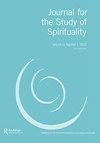Construction of a ‘Beliefs about Exceptional Experiences Scale’ (BEES): Implications of preliminary findings in Aotearoa New Zealand
IF 0.7
0 RELIGION
引用次数: 0
Abstract
ABSTRACT Exceptional Experiences (EEs) are highly prevalent among the general population and are often perceived as positive and meaningful spiritual occurrences. Several scales measuring experiences and beliefs relating to EEs have previously been developed, yet most are based exclusively on Western understandings and perspectives, thus introducing linguistic and conceptual biases. The goal of this study was to develop a valid measure of belief in EEs among the Aotearoa New Zealand population – a diverse multicultural society with two prominent ethnic groups, Māori (Indigenous peoples) and Pākehā (New Zealand European). A total of 39 items were developed through an intensive literature review and face-to-face interviews with 15 Māori participants, and subsequently piloted with 325 participants. Exploratory Factor Analyses (EFA) produced a three-factor 19-item solution, with excellent internal consistency. Preliminary findings indicate that Māori are significantly more likely to endorse EEs than Pākehā. Given that EEs can be interpreted as either spiritual, anomalous or even pathological according to cultural background, these findings have important implications for how EEs are addressed in the wider society and in mental health settings specifically.构建“关于特殊经历的信念量表”(BEES):新西兰奥特亚的初步发现的启示
摘要特殊经历在普通人群中非常普遍,通常被视为积极而有意义的精神事件。以前已经开发了几种衡量与EEs相关的经验和信念的量表,但大多数都完全基于西方的理解和观点,从而引入了语言和概念偏见。这项研究的目的是在新西兰奥特亚人中建立一种有效的平等就业机会信仰衡量标准,奥特亚人是一个多元文化的社会,有两个突出的种族群体,毛利人(土著人民)和Pākehā(新西兰欧洲人)。通过深入的文献回顾和对15名毛利人参与者的面对面访谈,共开发了39个项目,随后对325名参与者进行了试点。探索性因素分析(EFA)产生了一个三因素19项的解决方案,具有良好的内部一致性。初步调查结果表明,毛利人比Pākehā更有可能支持平等就业机会。鉴于根据文化背景,EEs可以被解释为精神性、异常性甚至病理性,这些发现对如何在更广泛的社会和心理健康环境中解决EEs具有重要意义。
本文章由计算机程序翻译,如有差异,请以英文原文为准。
求助全文
约1分钟内获得全文
求助全文
来源期刊

Journal for the Study of Spirituality
RELIGION-
CiteScore
2.50
自引率
7.10%
发文量
25
期刊介绍:
Journal for the Study of Spirituality is a peer-reviewed journal which creates a unique interdisciplinary, inter-professional and cross-cultural forum where researchers, scholars and others engaged in the study and practices of spirituality can share and debate the research, knowledge, wisdom and insight associated with spirituality and contemporary spirituality studies. The British Association for the Study of Spirituality (BASS) organises a biennial international conference and welcomes enquiries about membership from those interested in the study of spirituality in the UK and worldwide. The journal is concerned with what spirituality means, and how it is expressed, in individuals’ lives and communities and in professional practice settings; and with the impact and implications of spirituality in, and on, social policy, organizational practices and personal and professional development. The journal recognises that spirituality and spiritual values can be expressed and studied in secular contexts, including in scientific and professional practice settings, as well as within faith and wisdom traditions. Thus, Journal for the Study of Spirituality particularly welcomes contributions that: identify new agendas for research into spirituality within and across subject disciplines and professions; explore different epistemological and methodological approaches to the study of spirituality; introduce comparative perspectives and insights drawn from different cultures and/or professional practice settings; aim to apply and develop sustained reflection, investigation and critique in relation to spirituality and spiritual practices; critically examine the values and presuppositions underpinning different forms of spirituality and spiritual practices; incorporate different forms of writing and expressions of spirituality.
 求助内容:
求助内容: 应助结果提醒方式:
应助结果提醒方式:


